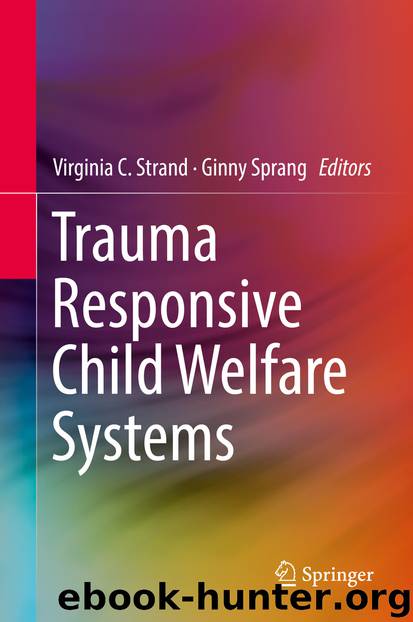Trauma Responsive Child Welfare Systems by Virginia C. Strand & Ginny Sprang

Author:Virginia C. Strand & Ginny Sprang
Language: eng
Format: epub
Publisher: Springer International Publishing, Cham
Staff Qualifications
According to the NCTSN Resource Parenting Curriculum Training Guidelines (NCTSN, 2012), there are three different roles that family partners and professionals may play in providing RPC including co-facilitators, staff facilitators, and master trainers. First, an RPC co-facilitator is either a resource parent or adult with childhood experiences in the child welfare system. Typically, co-facilitators have participated in a full course of RPC at least once and have been identified as a good candidate to help facilitate content from the curriculum as well as facilitate meaningful discussions in smaller groups during the delivery of the curriculum. Co-facilitators have varied numbers of years of experience as parents and can come from various cultural backgrounds. Co-facilitators are often compensated for their time and dedicate time outside of the groups to plan, debrief, and review the evaluations for RPC groups.
Staff facilitators are typically professionals in the human services field (e.g., child trauma mental health therapist or child welfare staff) who have the primary responsibility of coordinating all aspects of the workshop and who have received specialized training from an RPC master trainer. The average staff facilitator has a Master’s degree in the human services field and has several years of experience with most facilitators also holding a license in their prospective fields. It is very common for staff facilitators to serve as trainers of other curricula within their agencies and to have worked with foster and adoptive parents in the past (e.g., providing pre-service trainings). Successful staff facilitators are able to: (1) hold the perspective that those with lived experience (e.g., co-facilitators) are vital and equal partners; (2) hold a trauma-informed perspective and understand how traumatic stress symptoms can present in children; (3) share examples of traumatic events involving children in a way that participants can receive and learn from; (4) balance skills in delivering training content on trauma-informed parenting with managing a group pulling for varying levels of emotional responses from parents to the content; and (5) understand the fundamental concepts of cognitive-behavioral therapy, behavior management , and the child welfare system (Sullivan, 2015).
Finally, Master Trainers are members of or close collaborators of the NCTSN who are qualified to train other facilitators. Master Trainers usually have facilitated a significant number of RPC groups and have extensive experience working with resource parents including the use of a co-facilitator in groups. These trainers often have supplemental experience in training evidence-based treatments to mental health clinicians and are skilled in developing training for facilitators and co-facilitators that will adequately prepare them to deliver the group with fidelity to RPC. There are several Master Trainers throughout the NCTSN listed on the NCTSN Learning Center for Child and Adolescent Trauma .
Download
This site does not store any files on its server. We only index and link to content provided by other sites. Please contact the content providers to delete copyright contents if any and email us, we'll remove relevant links or contents immediately.
Good by S. Walden(3548)
The Social Psychology of Inequality by Unknown(3018)
The Checklist Manifesto by Atul Gawande(2844)
0041152001443424520 .pdf by Unknown(2843)
Get What's Yours for Medicare: Maximize Your Coverage, Minimize Your Costs by Philip Moeller(2621)
The Meaning of the Library by unknow(2564)
Guns, Germs and Steel by Diamond Jared(2365)
Borders by unknow(2301)
23:27 by H. L. Roberts(2245)
And the Band Played On by Randy Shilts(2197)
Being Mortal: Medicine and What Matters in the End by Atul Gawande(2106)
A Leg to Stand On by Oliver Sacks(2033)
The Hot Zone by Richard Preston(2013)
More Than Words (Sweet Lady Kisses) by Helen West(1853)
The Valachi Papers by Peter Maas(1846)
The Laws of Medicine by Siddhartha Mukherjee(1797)
The Andromeda Strain by Michael Crichton(1742)
Get What's Yours for Medicare by Philip Moeller(1677)
The Obesity Epidemic by Robyn Toomath(1673)
